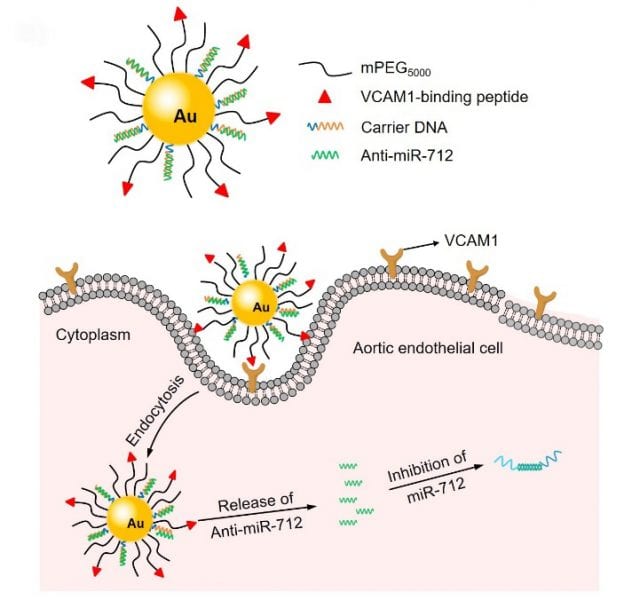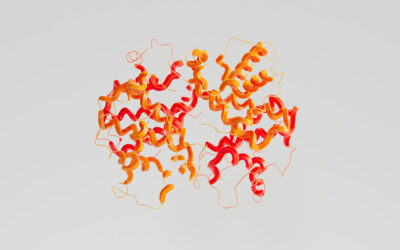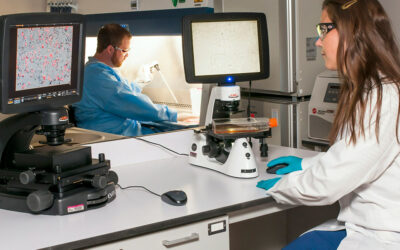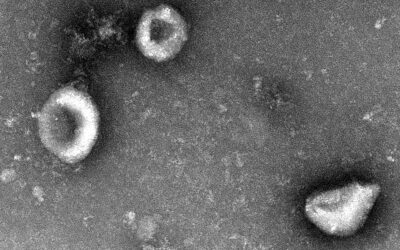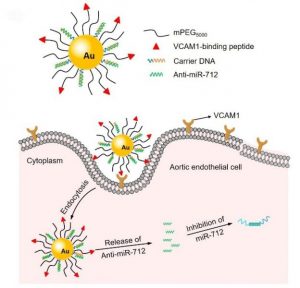 Atherosclerosis, a chronic, inflammatory disease of the vascular wall, is one of the leading causes of death worldwide. There is an urgent need to develop effective procedures for the prevention or treatment of atherosclerosis. Hanjoong Jo, Younan Xia, and colleagues have demonstrated a new delivery system based upon gold nanospheres for the targeted delivery of anti-miRNA into inflamed endothelial cells to suppress atherosclerosis.
Atherosclerosis, a chronic, inflammatory disease of the vascular wall, is one of the leading causes of death worldwide. There is an urgent need to develop effective procedures for the prevention or treatment of atherosclerosis. Hanjoong Jo, Younan Xia, and colleagues have demonstrated a new delivery system based upon gold nanospheres for the targeted delivery of anti-miRNA into inflamed endothelial cells to suppress atherosclerosis.
Atherosclerotic plaques preferentially develop in the curved or branched arterial regions exposed to disturbed flow that is characterized by a high-magnitude, unidirectional shear stress. The mechanical force will stimulate the expression of many pro-atherogenic genes in vascular endothelial cells, including miRNAs, small non-coding RNAs that can interact with the 3′ untranslated region of target mRNAs in a sequence-specific manner to trigger mRNA degradation and thus translational inhibition. As a therapeutic concept, one can inhibit the activity of miRNA and thus restore the expression of a target gene through the delivery of an anti-miRNA with a sequence complementary to the miRNA. However, one single miRNA can have hundreds of targets and off-target inhibition in normal tissue may lead to severe side effects. As a result, targeted delivery of therapeutic anti-miRNA into inflamed endothelial cells is crucial for realizing the full potential of gene therapy.
In this research, published in ChemNanoMat, it is demonstrated that vascular cell adhesion molecule 1 (VCAM1), which is highly expressed on the surface of endothelial cells under d-flow, can serve as a marker for the targeted delivery of genes or drugs into the inflamed endothelium. Specifically, the researchers effectively delivered anti-miR-712, an inhibitor of a key pro-atherogenic miRNA, into VCAM1-expressing immortalized mouse aortic endothelial cells by hybridizing anto-miR-712 with a carrier DNA that has a complementary sequence and is conjugated to the surface of gold nanospheres with a uniform, well-controlled size. The results suggest that the combination of VCAM1-binding peptide and gold nanosphere can provide an effective strategy for the highly selective delivery of anti-athero-miRNAs or other drugs into inflamed endothelium for inhibiting the formation of atherosclerotic plaques.
This article is part of a special issue on Nanobiointerfaces in ChemNanoMat. Click here to see the other articles in the issue.

